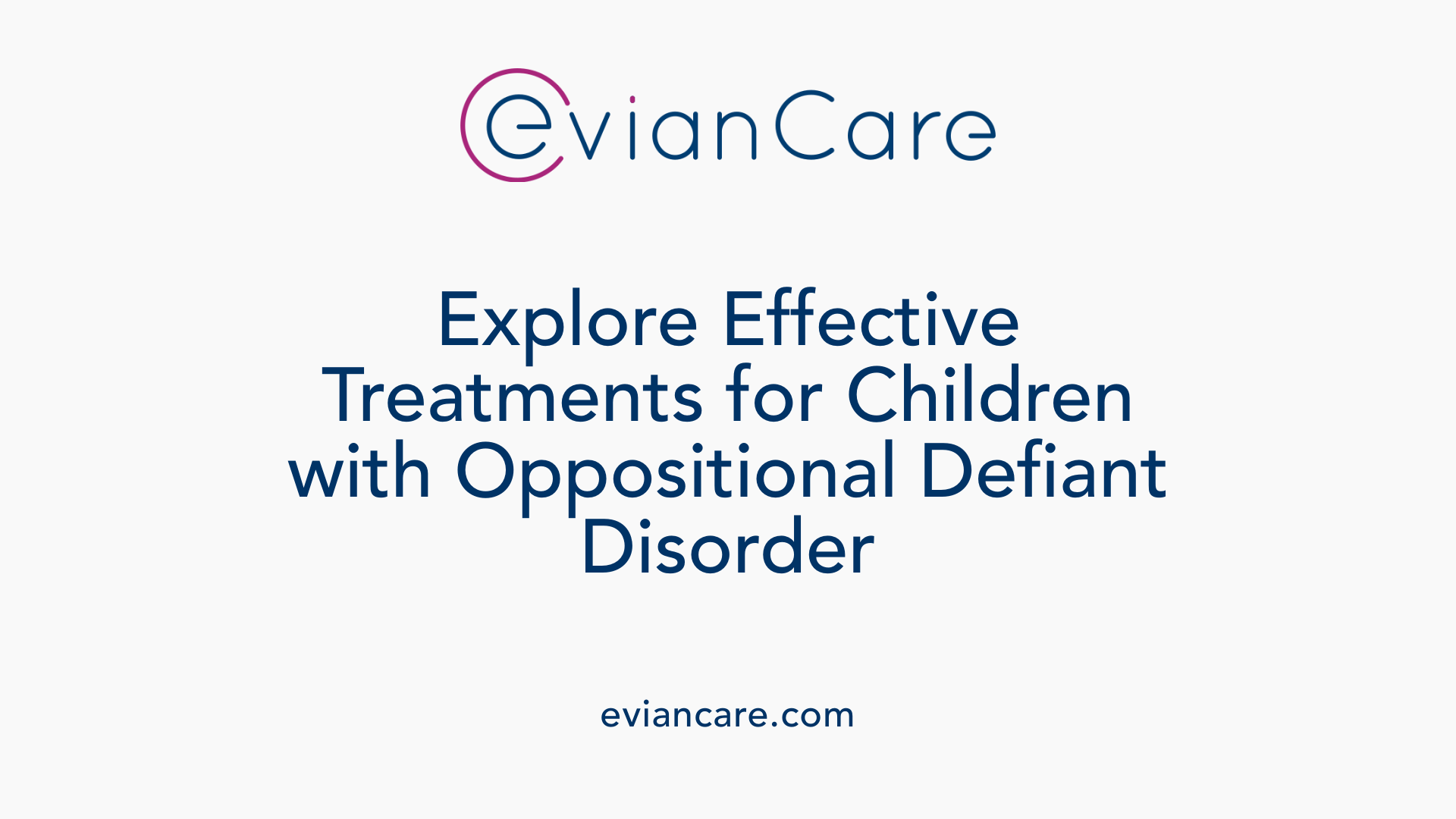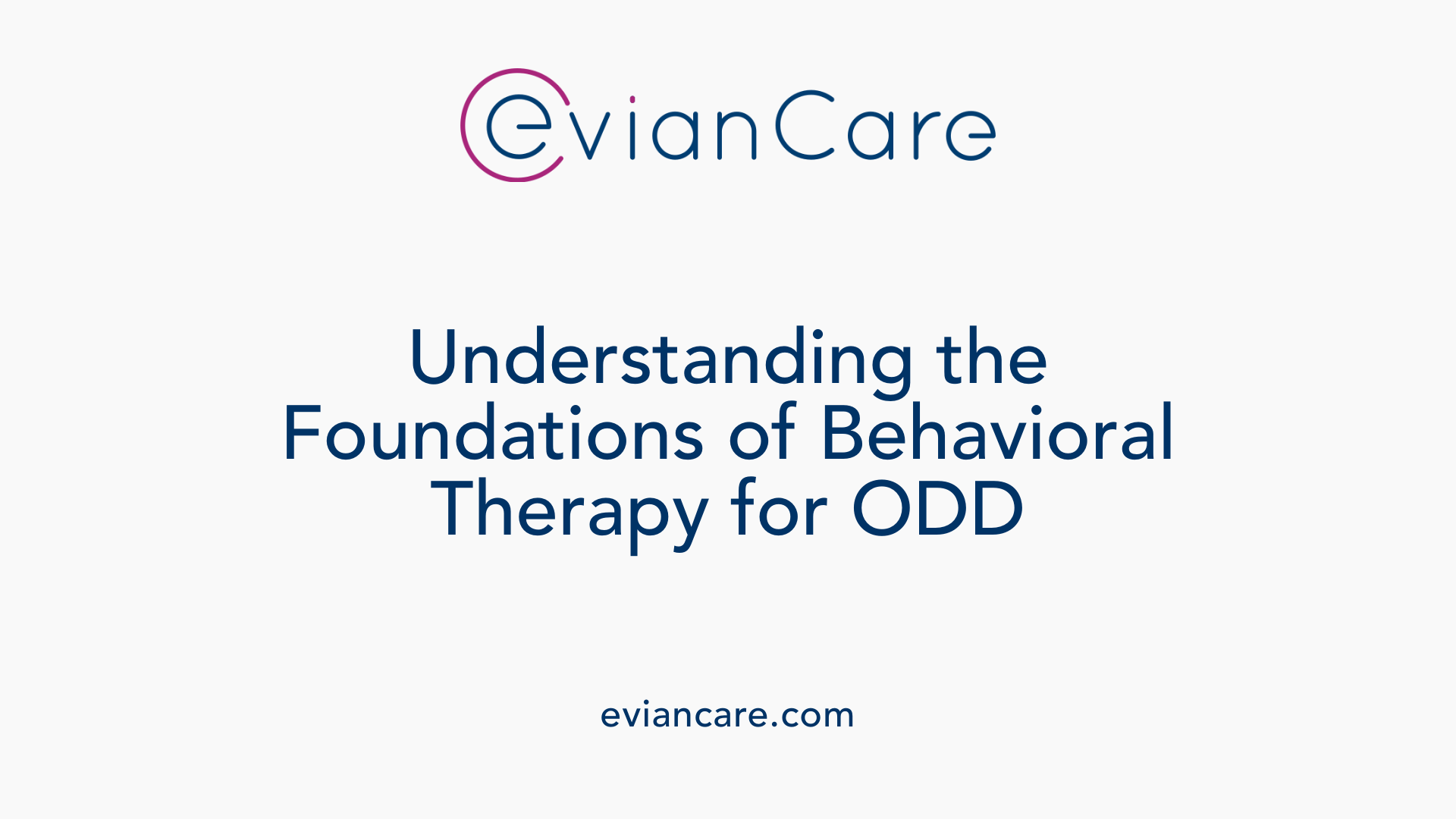
Understanding and Applying Behavioral Therapies in ODD
Oppositional Defiant Disorder (ODD) presents significant challenges for children, families, and educators due to frequent defiance, hostility, and oppositional behaviors. Behavioral therapy techniques offer evidence-based strategies to manage and reduce these behaviors, emphasizing positive reinforcement, improved communication, and emotional regulation. This article explores various behavioral approaches, including parent training, cognitive-behavioral therapy, and integrated family interventions, aiming to equip parents, caregivers, and professionals with effective tools for supporting children with ODD.
Overview of Behavioral Therapy Techniques for ODD

What treatment options are available for children with Oppositional Defiant Disorder?
Treatment for children with ODD primarily involves psychosocial interventions. The most common approaches include parent management training (PMT), family therapy, and school-based programs.
Parent management training focuses on teaching parents positive reinforcement strategies to encourage good behavior. Families often participate in multiple sessions aimed at developing consistent discipline and communication strategies. Family therapy seeks to enhance overall communication, resolve conflicts, and improve relationships within the family unit.
Cognitive-behavioral therapy (CBT) helps children understand their emotions, solve problems, and learn anger management techniques. It can also address co-occurring issues like ADHD or anxiety, which may worsen ODD symptoms. Though medication isn't typically used for ODD itself, it might be prescribed if other mental health conditions are present.
Treatment usually lasts several months or longer to ensure sustained improvement. Collaboration among mental health professionals, families, and educators plays a crucial role in delivering effective care.
Core Principles Underpinning Behavioral Therapies for ODD

What are common signs and causes of Oppositional Defiant Disorder in children?
Children with Oppositional Defiant Disorder (ODD) often display a distinct set of behavioral signs. These include frequent temper tantrums, persistent arguing with adults, refusal to comply with rules or requests, and a tendency to be easily annoyed or touchy. They might intentionally try to upset others or seek revenge when upset. These behaviors typically appear by age 8 and are observed across different settings like at home and school, lasting for at least six months.
The causes of ODD are complex and multifaceted. Genetic factors and differences in brain development play a role. Environmental influences such as inconsistent discipline, exposure to violence, and neglect can contribute. Family dynamics, including instability or conflict, also have an impact. Early intervention and positive parenting strategies, alongside personalized therapy, can help manage these symptoms and minimize their effects on social and emotional growth.
How can behavioral principles be effectively applied in therapy to improve child outcomes?
Implementing behavioral principles in therapy involves reinforcing positive behaviors while managing and reducing oppositional actions. A cornerstone is building structured routines to create a predictable environment, helping children feel secure and reduce defiance. Therapists and parents are encouraged to praise desirable behaviors genuinely and reward progress.
Consistent application of consequences—whether positive reinforcement for good behavior or calm, predictable responses to challenges—reinforces stability. Establishing clear, age-appropriate rules and calmly enforcing them helps develop understanding and compliance.
Modeling appropriate behavior and teaching emotional regulation are also essential. Patience plays a crucial role, as behavior change is gradual. Celebrating small successes encourages ongoing effort. Together, these strategies foster an environment conducive to behavioral improvement, supporting children in learning healthier ways to express themselves.
What are the critical factors for success in behavioral therapy for children with ODD?
Successful behavioral therapy hinges on several vital factors. Consistency is fundamental; applying strategies uniformly across home, school, and therapy sessions helps children learn expectations and consequences.
Patience is equally important, recognizing that behavioral change requires time and persistent effort. Active collaboration among caregivers, therapists, and educators ensures that reinforcement principles and rules are implemented effectively and uniformly.
Creating a warm, supportive, and structured environment encourages trust and facilitates learning. Parental responsiveness, including empathy, patience, and effective communication, underpins successful outcomes.
Continuous assessment and tailoring of interventions keep therapy relevant to the child's developmental stage and needs. Training parents and teachers in behavioral strategies amplifies the impact, promoting positive change over the long term. Overall, commitment from all involved parties, combined with a consistent, nurturing approach, offers the best chance for meaningful improvement in children with ODD.
| Aspect | Details | Additional Notes |
|---|---|---|
| Principles of Social Learning | Children learn behaviors through observation, imitation, and reinforcement. | Emphasizes modeling appropriate behaviors and rewarding positive actions. |
| Reinforcement and Consequences | Use of praise, rewards, and consistent discipline to shape behavior. | Positive reinforcement increases desired behaviors; consequences discourage oppositional acts. |
| Building a Structured Environment | Establishing routines, clear rules, and predictable responses. | Reduces anxiety and provides security, fostering better behavior. |
| Consistency and Patience | Applying strategies reliably over time; recognizing slow progress. | Crucial for long-term behavior change and maintenance. |
| Emotional Regulation | Teaching children skills to manage their emotions effectively. | Supports reduction of anger and impulsivity, improving overall conduct. |
This comprehensive approach supports children with ODD by reinforcing positive behaviors, providing stability, and fostering patience and understanding throughout the treatment journey.
Summary and Future Perspectives in Behavioral Therapy for ODD
Behavioral therapy techniques for children with Oppositional Defiant Disorder encompass a comprehensive array of evidence-based strategies designed to foster positive behavior, emotional regulation, and social competence. Approaches like parent management training, cognitive-behavioral therapy, and family-focused interventions form the cornerstone of effective treatment programs. Success hinges on consistent application, patience, and collaboration among families, schools, and mental health professionals. As research advances, integrating innovative methods such as social skills training and collaborative problem solving continues to enhance outcomes. Early intervention and a tailored, multimodal approach are essential for helping children with ODD develop healthier behaviors, improved relationships, and a stronger foundation for their future emotional and social well-being.
References
- Oppositional defiant disorder (ODD) - Diagnosis and treatment
- Oppositional Defiant Disorder (ODD): Symptoms & Treatment
- CBT for Oppositional Defiant Disorder | Charlie Health
- Quick Guide to Oppositional Defiant Disorder - Child Mind Institute
- Parent Management Training Combined with Group-CBT Compared ...
- Using Cognitive Behavior Therapy for Oppositional Defiant Disorder ...
- Treating Oppositional Defiant Disorder (ODD) - Psych Central
- How To Manage Oppositional Defiant Disorder (ODD) in Children
- Oppositional Defiant Disorder - StatPearls - NCBI Bookshelf












